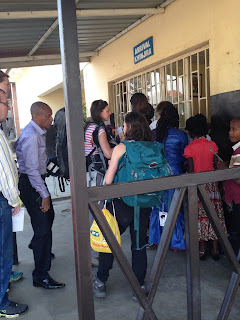or...as it's known in Rwanda: the Congo.
Despite what I'm sure are wise U.S. travel warnings, a few friends and I marched our way into the Democractic Republic of the Congo (DRC) and up the top of an active volcano. It was called Nyiragongo Volcano and it was located at the southern edge of Virguna National Park (for a phenomenal documentary by the name of "Virunga", check your brother's pilfered Netflix account.) After a night in Gisenyi, we stampeded our way to the Congolese border, cold weather gear in tow. After 4 lines and 2 hours, including many people shoving their way in front of us, we paraded into the Virunga National Park office in Goma to grab our park receipt and snag (a very expensive ride) to the park.
Jostling along the civil-war beaten streets to Kibati, we took in the lava-darkened, impoverished landscape. With a volcanic eruption that covered half of Goma in 2002 and rebel fighting that spurred the UN to construct a military base there in 2012, the Congo's unrest remains resound and palpable.
One indicator? I didn't see a single metal bicycle but, instead, plenty of large wooden bicycle-like contraptions that functioned as both a method of transport for people and kilos of goods.
Our hike to the top of Nyiragongo took about about 5 hours and was accompanied by a slew of porters and park rangers welding AK-47's. Classy!
The landscape transformed from jungle forest to pine trees to rocky terrain as we followed switchback after switchback. With plenty of rest time and a reasonably fashioned path, the hike wasn't too bad. At 3,470 m, we reached our goal (selfies in front of lava!) and proceeded to document the night with Iphones and my crappy digital camera. After sipping on a lukewarm Tusker as a reward, I stared for hours at the kaleidoscope of molten lava as conversation tinged with Irish, Chinese, French and American accents filtered through my ears.

As the sun ducked behind the Western edge of the crater, the sparkling red lava shown up from the hole in the very center of the crater accompanied by somewhat disconcerting "pops!" and "cracks!" as the volcano churned beneath our feet. We heated up our stashed of food over a charcoal stove, roasted some rouge marshmallows and curled ourselves into balls of heat as we slept at the edge. It was glorious! Albeit freezing cold...
For the YouTube playlist on our adventures up the volcano, you can watch my completely ameteur videos here.
Another exciting fact (for me!) was that I could finally use my ancient Swahili to a fuller extent. While Congolese Swahili is heavily mixed with French and the time-tested Tanzanian saying like "digging for medicine" for going pee in a bush were non-applicable, I was ecstatic to pick up phrases and eaves drop on conversations again. The Congolese are louder and rowdier than their Rwandan counterparts as well.
Despite what I'm sure are wise U.S. travel warnings, a few friends and I marched our way into the Democractic Republic of the Congo (DRC) and up the top of an active volcano. It was called Nyiragongo Volcano and it was located at the southern edge of Virguna National Park (for a phenomenal documentary by the name of "Virunga", check your brother's pilfered Netflix account.) After a night in Gisenyi, we stampeded our way to the Congolese border, cold weather gear in tow. After 4 lines and 2 hours, including many people shoving their way in front of us, we paraded into the Virunga National Park office in Goma to grab our park receipt and snag (a very expensive ride) to the park.
Jostling along the civil-war beaten streets to Kibati, we took in the lava-darkened, impoverished landscape. With a volcanic eruption that covered half of Goma in 2002 and rebel fighting that spurred the UN to construct a military base there in 2012, the Congo's unrest remains resound and palpable.
One indicator? I didn't see a single metal bicycle but, instead, plenty of large wooden bicycle-like contraptions that functioned as both a method of transport for people and kilos of goods.
 |
| You can see the wooden bike in the bottom right corner. |
The landscape transformed from jungle forest to pine trees to rocky terrain as we followed switchback after switchback. With plenty of rest time and a reasonably fashioned path, the hike wasn't too bad. At 3,470 m, we reached our goal (selfies in front of lava!) and proceeded to document the night with Iphones and my crappy digital camera. After sipping on a lukewarm Tusker as a reward, I stared for hours at the kaleidoscope of molten lava as conversation tinged with Irish, Chinese, French and American accents filtered through my ears.

As the sun ducked behind the Western edge of the crater, the sparkling red lava shown up from the hole in the very center of the crater accompanied by somewhat disconcerting "pops!" and "cracks!" as the volcano churned beneath our feet. We heated up our stashed of food over a charcoal stove, roasted some rouge marshmallows and curled ourselves into balls of heat as we slept at the edge. It was glorious! Albeit freezing cold...
For the YouTube playlist on our adventures up the volcano, you can watch my completely ameteur videos here.
Another exciting fact (for me!) was that I could finally use my ancient Swahili to a fuller extent. While Congolese Swahili is heavily mixed with French and the time-tested Tanzanian saying like "digging for medicine" for going pee in a bush were non-applicable, I was ecstatic to pick up phrases and eaves drop on conversations again. The Congolese are louder and rowdier than their Rwandan counterparts as well.
Till next time!



















